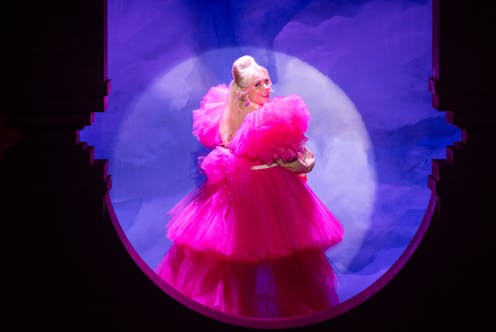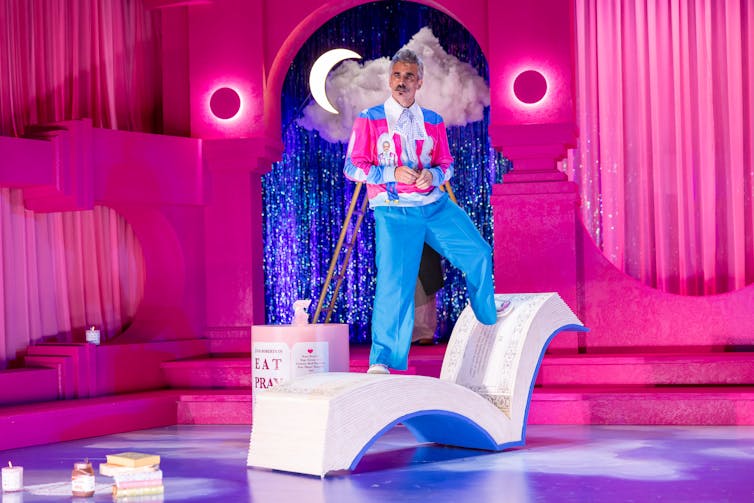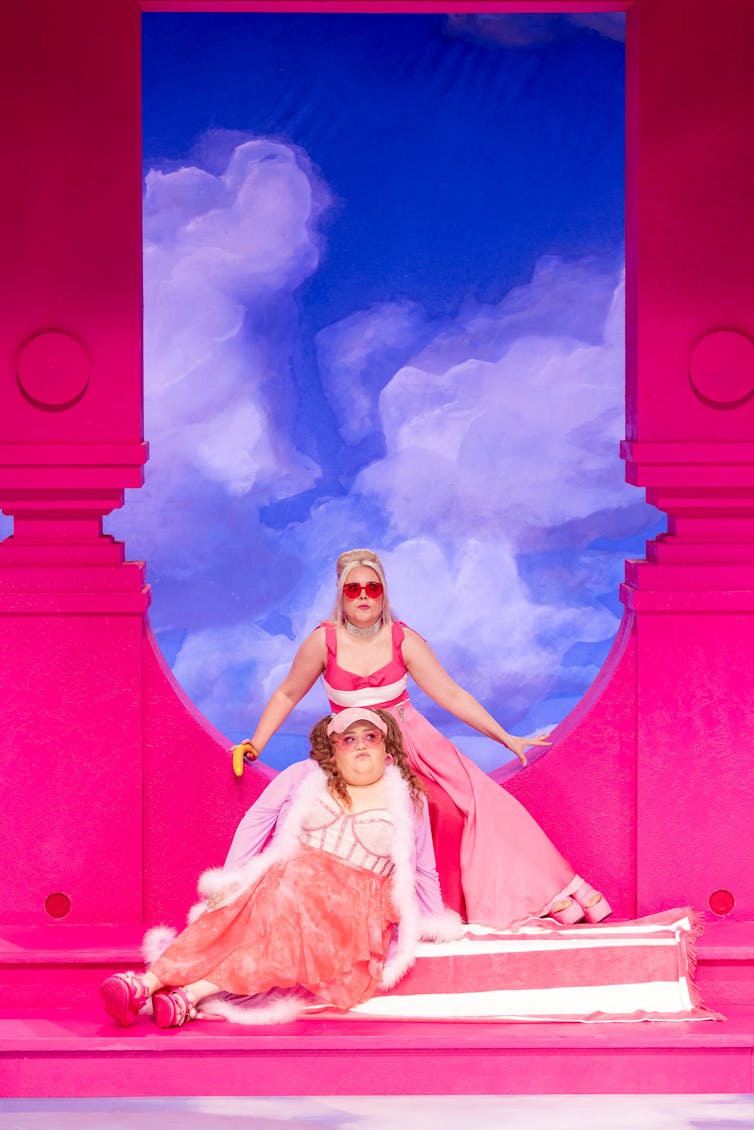Source: The Conversation (Au and NZ) – By Lisa Portolan, PhD student, Institute for Culture and Society, Western Sydney University

Daniel Boud/Sydney Theatre Company
Van Badham’s A Fool in Love at the Sydney Theatre Company lampoons the modern Sydney vibe: a city obsessed with wealth, status and, of course, love.
Designer Isabel Hudson’s candy-coloured set, lolly-pop-esque orange trees and sherbet-coloured tinsel attire seem to vibrate the essence of the city as we move juggernaut-like towards the festivities of Valentine’s day and Mardi Gras.
Based on Lope de Vega’s 17th-century production La Dama Boba, Badham transports us to a camp version of the original nestled in a bourgeois beachside enclave – the embodiment of Sydney’s eastern suburbs. We find ourselves in a world obsessed with private schools, linen attire, and the maintenance (if not stock-piling) of funds.
What’s love got to do with it?
Ottavio (Johnny Nasser) is yet another linen-clad specimen, the heir to a once-thriving empire in the automotive parts manufacturing realm, now plummeting into irreparable decline.
To sustain his lavish lifestyle and secure the dwindling family fortune, he faces the daunting task of orchestrating the marriage of his eldest daughter, Phynayah (Contessa Treffone).
To inherit her eccentric uncle’s remarkable fortune – and maintain her family’s coveted social standing – Phynayah must marry before she’s 30. A difficult task in a city like Sydney, where romantics are snuffed out by dating apps and the idea there are always greener pastures one swipe away.
However, such a romantic deal (the promise of wealth and cultural standing), attracts more than one ambitious suitor. Phynayah’s clever and social climbing sister Vanessa (Melissa Kahraman) also “brings the boys to the yard” for herself.

Daniel Boud/Sydney Theatre Company
The tale of making love to Phynayah is not as straightforward as it seems. Beautiful, and soon to be in possession of great wealth, Phynayah could be perceived as a modern catch: but these days suitors want more. They expect brains as well – not to mention a sizeable Instagram and TikTok account.
Clueless, witless, and perpetually silly, Treffone’s Phynayah embodies immaturity itself, donning a crochet bikini and serving as a living banal joke. The question looms: is any social climber desperate enough to align themselves with a poolside belle whose intellectual prowess is overshadowed by her towel?
Frothy tales
In this electric and funny rendition directed by Kenneth Moraleda, Badham invites us to comment on the economics of love. While Jennifer Lopez told us “love don’t cost a thing,” economic data would argue otherwise.
The aspirational suitors, the “new money”, are from Western Sydney and other “undesirable” burbs. In seeking to seduce Phynayah (or Vanessa), they are swallowed in frothy, silly, hapless tales.

Daniel Boud/Sydney Theatre Company
The unholy union of love and the consumer marketplace is not by any means a new one. As Jane Austen told us in Pride and Prejudice, “It is a truth universally acknowledged, that a single man in possession of a good fortune, must be in want of a wife” – and vice versa.
If we were to extend back historically, this kind of mating based on wealth, social or cultural is old news. Women and men were often traded and dowries were applied. The notion that you can pick your own partner based on love is a uniquely modern one, and it can be unpicked quickly.
Badham is not only inviting us to reflect on the economics of love but also gender and cultural politics. Women’s visual, intellectual and social value is paraded, catwalk style, to please men (suitors, fathers, and onlookers alike).
To use Austen again, Mr Darcy sets the benchmark high when he defines his idea of an accomplished woman:
A woman must have a thorough knowledge of music, singing, drawing, dancing, all the modern languages, to deserve the word; and besides all this, she must possess a certain something in her air and manner of walking, the tone of her voice, her address and expressions, or the word will be but half deserved.
This kind of identity management is nothing new and is exacerbated by social media. It is distinctly pervasive for women who are generally represented as having (or being) too little or too much. Too fat or too thin; too clever or too stupid; too free or too restricted. Phynayah and Vanessa embody this tension.

Daniel Boud/Sydney Theatre Company
Alongside this, the discussion on the aspirational suitors and their geographical genesis demonstrates (disturbingly) that the “latte line” (or should I say “linen line?”) dividing Sydney’s western and eastern suburbs is congealing.
A Fool in Love challenges us to consider this widening divide and growing social inequity through the lens of the tomfoolery of love. The haves and have nots of linen wardrobes – and also of privilege.
A Fool in Love is as bold as it is delightfully ridiculous and sharp-witted. Social satire at its finest.
A Fool in Love is at the Sydney Theatre Company until 17 March.
Read more:
Another tale of two cities: access to jobs divides Sydney along the ‘latte line’
![]()
Lisa Portolan does not work for, consult, own shares in or receive funding from any company or organisation that would benefit from this article, and has disclosed no relevant affiliations beyond their academic appointment.
– ref. A Fool in Love is delightfully ridiculous and sharp-witted: social satire at its finest – https://theconversation.com/a-fool-in-love-is-delightfully-ridiculous-and-sharp-witted-social-satire-at-its-finest-221320




